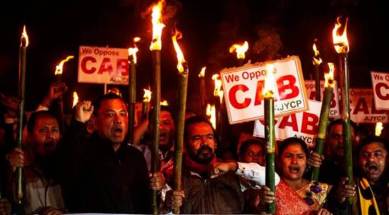Stay updated with the latest - Click here to follow us on Instagram
SC to examine constitutional validity of Citizenship Act but refuses to stay its operation
A three-judge bench headed by Chief Justice S A Bobde fixed the pleas for the hearing on January 22, next year.

The Supreme Court Wednesday issued a notice to the Centre on a batch of pleas challenging the constitutional validity of the amended Citizenship Act, but refused to put a stay on its operation.
A three-judge bench headed by Chief Justice S A Bobde fixed the pleas for the hearing on January 22, next year. The bench, also comprising of Justices B R Gavai and Surya Kant, also instructed the Attorney General to ask the government to publish details of the Act in the media so that the people can develop a clarity.
The court’s observation came following a request by lawyer Ashwani Kumar Upadhyay who said people were confused about the new legislation.
Among those who filed the petitions are senior Congress leader Jairam Ramesh, the Indian Union Muslim League and Asom Gana Parishad, an ally of the ruling BJP in Assam. Follow LIVE updates on CAA protests
The new law grants citizenship to Hindus, Sikhs, Buddhists, Christians, Jains and Parsis who entered the country from Pakistan, Bangladesh and Afghanistan until December 31, 2014. It has become controversial largely because it excludes Muslims.
Challenging the law, petitioners have argued that the act classifies immigrants on the basis of religion and, hence, is unconstitutional. Stating that the law is against the basic structure of the Constitution as it divides the people on the basis of religion, the petitioners wanted a stay on the act. The law, petitioners have argued, affects the fundamental principle of secularism of the nation.
There have been widespread protests in Assam and West Bengal since the passage of the Citizenship Amendment Bill (CAB) in the Rajya Sabha earlier this month. After President Ram Nath Kovind gave his assent to the Bill, protests turned violent in the North-East with curfew being imposed in parts of Assam and Meghalaya. Northeastern states fear the law will lead to legitimizing of immigrants from neighbouring Bangladesh and change the demographics of the region. In Assam, five people have died in the ensuing violence.
Protests also spread to Delhi and tensions were heightened as the police lobbed teargas shells inside the campus of Jamia Millia Islamia university and allegedly dragged students out of the library and the mosque, and assaulted them after protests against the Citizenship Act turned violent. This triggered a series of protests at multiple universities across the country, where students hit the streets in solidarity with the Jamia students. At northeast Delhi’s Seelampur, a protesting mob clashed with the police.
Amid the protests, leaders of 12 Opposition parties led by Congress president Sonia Gandhi met President Ram Nath Kovind Tuesday and requested him to intervene and advise the government to immediately repeal the Act. Chief ministers of five states — West Bengal, Punjab, Kerala, Madhya Pradesh and Chhattisgarh — have indicated that the new law will have no place in their respective areas.
Home Minister Amit Shah has, however, clarified that there was no question of rolling back the new citizenship law.